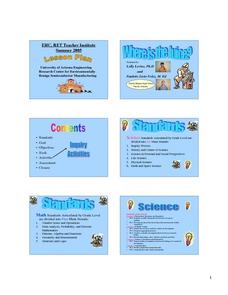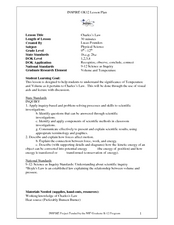Curated OER
Greenewables
Learners form expert engineering teams working for the (fictional) alternative energy consulting firm, Greenewables, Inc. Each team specializes in a form of renewable energy used to generate electrical power: passive solar, solar...
Curated OER
Applied Science -Physics (2B) Pre Lab
Second graders look at different types of energy. In this energy lesson, 2nd graders define energy and the difference between kinetic and potential energy. They see examples with falling books and a slinky.
Curated OER
Collisions and Momentum: Bouncing Balls
Middle schoolers explore the concepts of potential and kinetic energy by bouncing assorted balls on different surfaces and calculating the momentum for each ball. They give examples of collisions and momentum in sports and understand...
Curated OER
Zoo Poo
Students use Internet research to determine the amount of carbon dioxide produced per unit energy for biomass and coal. In this alternative energy instructional activity, students research to find out how much energy and carbon dioxide...
Curated OER
Where Is The Juice?
Students are introduced to the component's of Ohm's Law. In groups, they practice their problem solving skills by reviewing problems solved earlier. They participate in activities that help them gather information on the importance of...
Teach Engineering
Bouncing Balls
How high will it bounce? Groups determine the height different balls bounce off of different surfaces. By performing the necessary calculations, they determine the initial and final momentum of the balls. The included worksheet provides...
Teach Engineering
Light Up Your Life
How do lighting types affect energy efficiency? Explore different types of lighting and the energy they use. Pupils learn about types of lights and calculate the energy used during a typical school year. They discover that being energy...
Kenan Fellows
Engineering Skills Through Problem Based Learning
Navigate the ups and downs of learning about energy. Future engineers consider how potential and kinetic energy apply to roller coasters. They design a roller coaster of their own and then use computer design software to showcase their...
Teach Engineering
Light vs. Heat Bulbs
Careful, that light bulb is hot! Compare heat and light energy using a simple light bulb. The exercise addresses energy conservation and presents actual calculations to determine the most cost-effective light bulb.
Wind Wise Education
What is the Cost of Inefficiency?
What does it cost to keep the lights on? Through a hands-on activity, class members use a watt meter and determine the amount of energy different types of light bulbs use. The class then determines the financial and environmental cost of...
Curated OER
Introduction to Materials Science - Part B
Students are able to give specific examples of what to do and what not to do during given safety situations, and classify materials as metals, polymers, ceramics/glass, or composites. They are able to distinguish between chemical and...
Curated OER
Companion to Superfund -- The Resource Conservation and Recovery Act Program
Young scholars examine the Resource Conservation and Recovery Act. They work together to discover how their local community handles waste disposal. They complete a worksheet to end the lesson.
Curated OER
Potato Launcher Energy Lab
Students investigate conservation laws using a potato launcher. In this physics lesson, students measure angles, time and distance of the potato. They discuss applications of experiments like this.
Curated OER
Charles’s Law
High schoolers describe the relationship between temperature and volume. In this chemistry lesson, students perform an experiment and record their their results. They use Charles' law to explain their observations.
Curated OER
Alternative Energy
Students identify the five major alternative energy sources. In this physical science instructional activity, students assess the advantages and disadvantages for each type of energy. They complete a concept map using information they...
University of Florida
Understanding Car Crashes: It's Basic Physics!
Make an impact on young physicists with this fun collection of resources. After first watching a video and taking notes on the physics of car crashes, students go on to complete a series of activities that explore the concepts of energy,...
Virginia Department of Education
Aspirin Analysis
Laughter may be the best medicine, but aspirin is also important. Young chemists analyze aspirin tablets using titration in this lab experiment. They then repeat the entire experiment using a different aspirin brand.
Rice University
College Physics for AP® Courses
Take a look at an organized physics course. The 34-section electronic textbook covers material in AP® Physics 1 and 2. Teachers use the text to supplement lectures and have the class work through the labs. Each section contains multiple...
College Board
AP Physics 1 and 2 Inquiry-Based Lab Investigations
Have you ever wondered what type of AP Physics investigations The College Board wants? This is the guide for you! Sixteen labs covering both Physics I and II will get you started and inspire you to meet the requirement of 25 percent of...
Curated OER
Building a Roller Coaster
Students describe the law of conservation of energy. They identify the conversion between potential and kinetic energy. They investigate and describe the application of Newton's Laws of Motion.
Curated OER
Circuit Lab
Students explore the properties of electricity. This lab shows students the need for a circuit in order to have a flow of electricity. It demonstrates Ohm's law, which relates voltage, current, and resistance.
American Chemical Society
Exothermic, Endothermic, and Chemical Change
Scientists can't observe bonds breaking or forming, so how do they distinguish between exothermic and endothermic reactions? Young scholars complete two experiments to do just that. They monitor temperature change and calculate the...
University of Texas
Lives of Stars
Stars exist from a few million years to over 10 billion years, depending on their mass. Scholars perform a play acting as stars to learn about their different life cycles. They develop an understanding of many of the fundamental concepts...
Curated OER
Work and Energy
Students show that energy is conserved in the laboratory. They calculate the work done by a force on an object as the product of the force and a displacement of the object from a reference point.

























